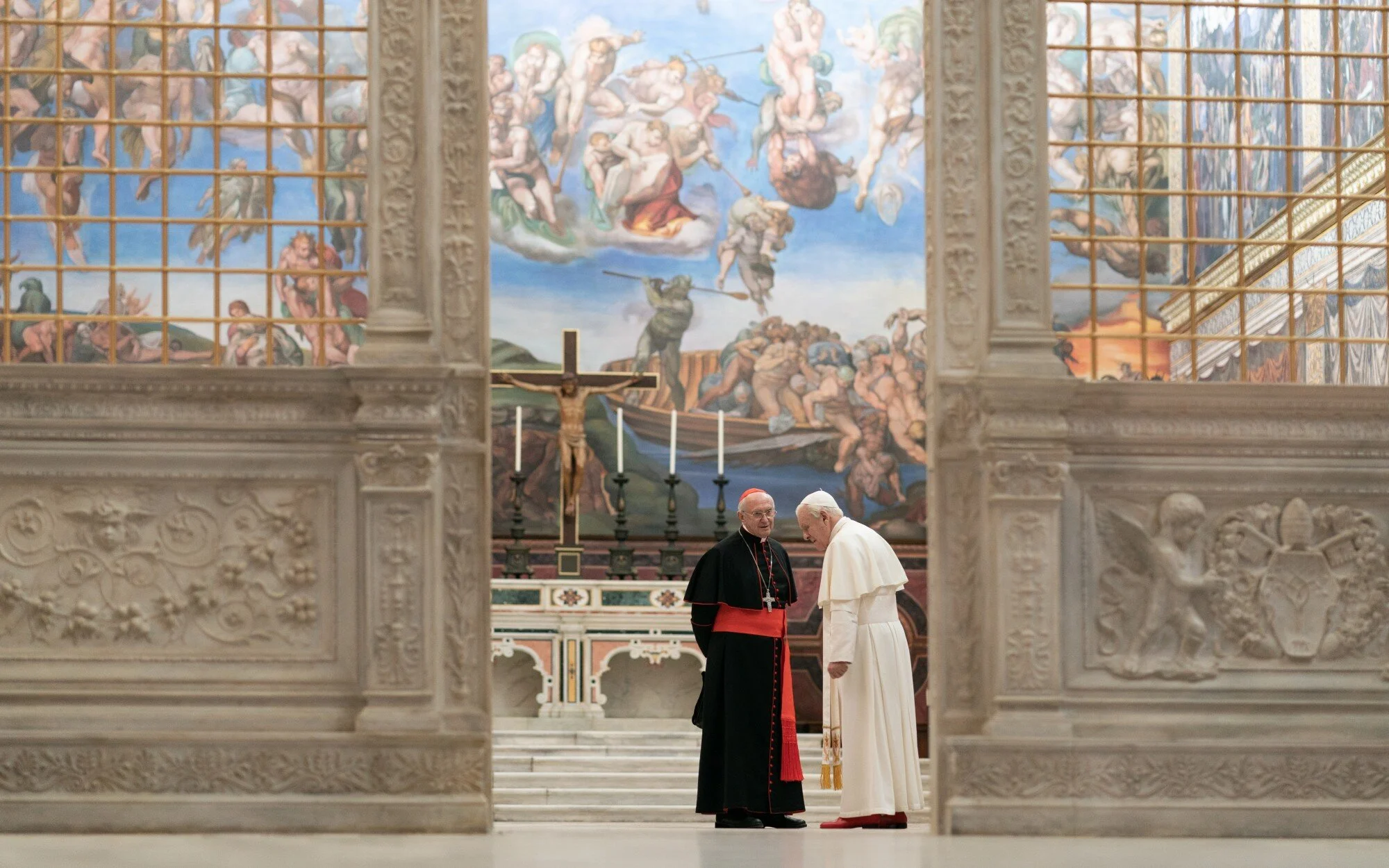How a Movie About the Pope Made Me Feel More Connected to Judaism
There was never a time when I actually thought to myself “I don’t want to be jewish”.
(For those who know me, this is a pretty significant achievement. I overthink and am indecisive about everything.)
My religious questioning was limited to the normal thoughts - What if there really isn’t a God? What if I was born into this crazy thing that I don’t know is crazy? Etc… I didn’t think too much of these questions, as Judaism resonated with me enough to overpower these thoughts for the time being.
However, as I grew older and my experiences broadened, my relationship to religion was challenged in a new way.
Becoming an adult comes with a newfound social consciousness. Coming from a privileged background, a well rounded education, and an abundance of resources, I felt the desire to expand my worldview with perspectives that were real and inclusive. Thus, my thoughts on religion naturally evolved. So what did these questions become? Pressing, concerning, and more relevant ones. They were no longer internally focused or vague enough to be left unanswered. For instance, questions like “why does God let bad things happen” gained a striking importance to me. Some of these answers were disturbing. At times, it no longer felt right to stand up for a God protecting all of us. Did religion make me less socially responsible?
This period of growth forced me to think about what values my religion actually instilled in me. Was it really about a man in the sky who would make everything okay in the world? My days in Hebrew school, (despite the fact that I was in the “special” group for slow learners), taught me otherwise. Judaism, like many other religions, is ingrained with important moral values. For example, “Al tifrosh min hatzibur”: be in solidarity. It’s our responsibility to play an active role in our community. “Kavod”: respect. Have regards for the rights, dignity, and feelings of others. And maybe the most memorable for young Jews who still have the jingle stuck in their heads after a decade - “Tikkun olam”. We have an obligation to work towards making the world right and whole.
But there are still times when it feels strange to be religious. The media often portrays intensely religious people as bigots who unfortunately choose to act on their bigotry. I started watching a show, (that I actually highly recommend), called “Unorthodox” on Netflix. It offers a terrifying look into a small branch of my own religion, depicting exactly the type of bigoted people who give religion a bad name. As troubling as they are, those narratives are important to showcase. But just as these storylines are necessary, I have come to find that the other side of religion can be just as enlightening.
I recently stumbled across a culture that was almost completely alien to me. For the first time in a while, I was reminded of the unique, particular, beautiful qualities of religion that make me proud to be a person of faith. And even more surprising to me: this newfound appreciation for Judaism was sparked by a movie about Catholicism.
⌿
Directed by Fernando Meirelles, Two Popes is described as a drama/comedy about Pope Benedict and the future Pope Francis working to find common ground in order to forge a new path for the Catholic Church.
While my overall captivation by this film cannot solely be attributed to aesthetics, I must mention that this movie is filled with the most beautiful visual depictions of Catholic tradition. The imagery of cardinals from all around the world coming together for a common purpose, and the artful and meticulous nature with which they elect a new pope, emits a feeling of unity that is almost indescribable. To be honest, also kind of an ironic feeling because for myself and many others, a large part of being religious is sifting through the seemingly mystical and magical tales to reach the grounded moral messages. However, just watching a representation of Catholic traditions in “Two Popes” felt truly otherworldly. Though the Jewish customs I’ve performed are perhaps less glamorous than entering a secret conclave in The Vatican, I was reminded of the power of all religious tradition. Not only are they extremely beautiful, but they connect us with generations of humanity in a way that few other things can.
Along with its striking sensory depictions, the plot of this film contained symbolism that connected me to religion in an even deeper way. The film employs many dichotomies. Discussions of old and new, saint and sinner, traditional and modern. But unlike other portrayals of these time-old debates, these contrasting themes are discussed without any prejudice towards one or the other. Furthermore, Pope Benedict and Pope Francis themselves stand for completely different things. However, they never let it deter them from coming up with the best solution for the problem at hand. I believe that this is what religion is truly about, at its best. The idea of God sets a precedent that there is something greater, some more incredible entity in existence at all times. In this context, we are all simply human.
This film is a beautiful reminder that centrally, religion is about people. It is a reminder that even the people we admire most are flawed, and make mistakes. The way in which the filmmakers put this simple message into a religious context blew me away. The insane acting in the film added all the more value to such statements. I love the quote from Pope Benedict’s character - “We all suffer from spiritual pride. We all do. You must remember that, […] you are not God. In God, we move, and live, and have our being. We live in God, but we are not of it. You’re only human.”
(Anthony McCarten of The Theory of Everything and Bohemian Rhapsody wrote the award-winning screenplay.)
I think one of the most beautiful things about this movie is that it never tried to paint religion as something it’s not. We know that every system, every process has flaws. The filmmakers were unafraid to portray the flaws within the system of Catholicism. In the film, Pope Benedict, who is the entire Catholic world’s connection to God, opens up that he himself hasn’t been able to connect to his spirituality. Pope Francis also discusses the ways in which their religion has failed people. The creators of this film let the viewers develop their own comprehensive perspectives about the structures at play. Being that outside of the film there are intense, valid criticisms of the Catholic Church and every religion for that matter, I appreciated the ways in which the film explored everything from the oldest ideological ‘grey areas’ to the more socially pressing issues of today.
“We have spent these last years disciplining anyone who disagrees with our line on divorce, on birth control, on being gay. While our planet was being destroyed, while inequality grew like a cancer. We worried whether it was alright to speak the Mass in Latin, whether girls should be allowed to be altar servers. We built walls around us, and all the time, all the time, the real danger was inside. Inside with us.”
(Embracing the inadequacies of religion for me can be like listening to a friend talk about a time they messed up. It fosters transparency, trust.)
⌿
All in all, while it was moving for me to see a piece that connected me back to my faith, you certainly don’t have to be religious to hear the powerful messages in “Two Popes”. After all, religion was created as a means to resonate with the human experience, so whether or not you believe in God, I highly recommend this film for the way it shines light on human values and issues, through a conversation about Catholicism.
Personally, this film instilled in me the motivation to nourish my connection with religion, and empowered me to continue asking myself those difficult questions, just no longer in fear of the answers.
Image Credit
Stills from Netflix’s Two Popes — Sistine Chapel photo by Franco Origlia/Getty Images



